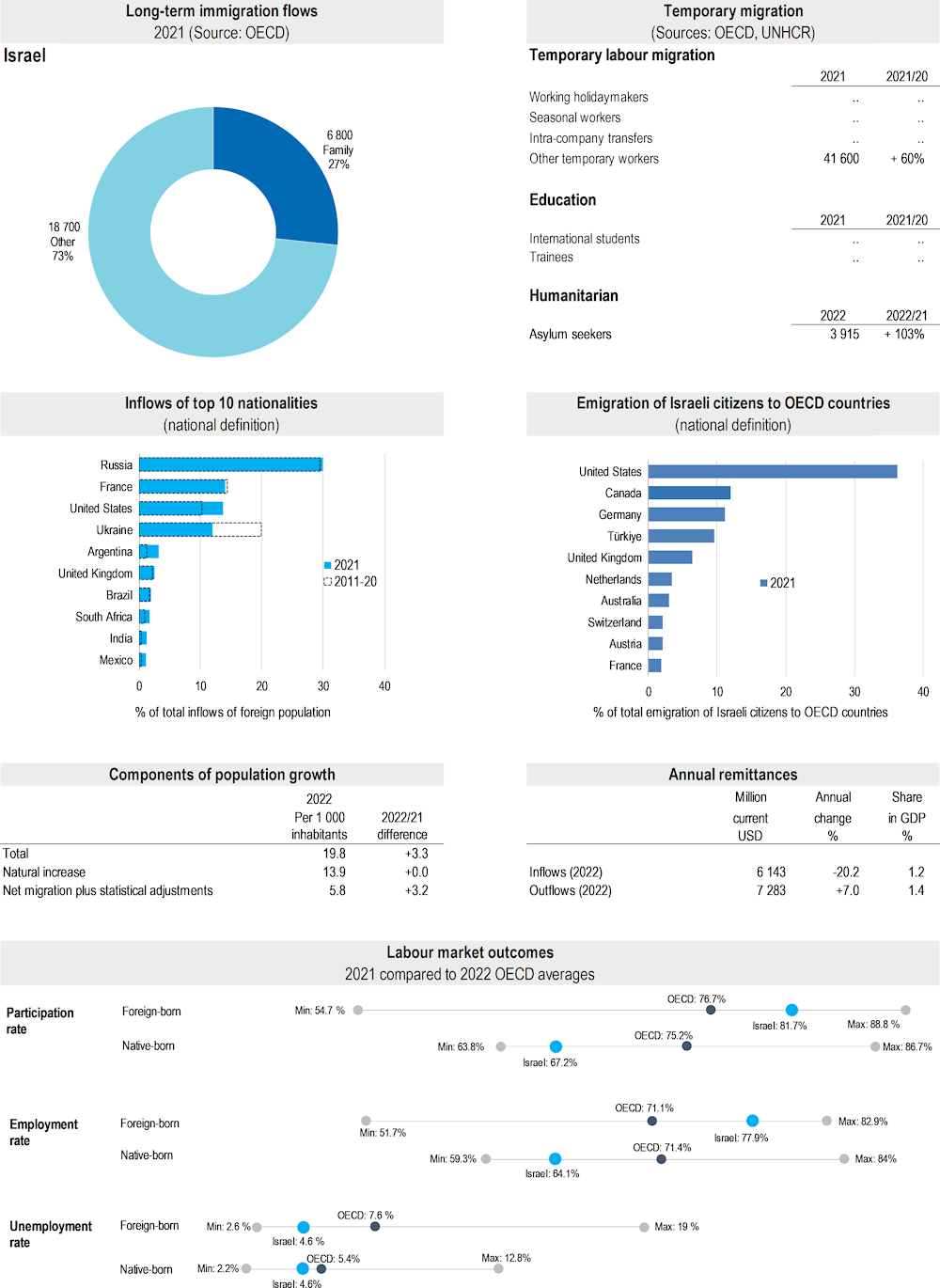In 2021, Israel received 25 000 new immigrants on a long-term or permanent basis (including changes of status), 30% more than in 2020. This figure comprises 73% under the Law of Return and 27% family members (including accompanying family). Around 42 000 permits were issued to temporary and seasonal labour migrants.
Russia, France and the United States were the top three nationalities of newcomers in 2021. Among the top 15 countries of origin, the Former USSR registered the strongest increase (1 700) in flows to Israel compared to the previous year.
In 2022, the number of first asylum applicants increased by 100%, to reach around 3 900. The majority of applicants came from Russia (1 000), Belarus (300) and India (300). The largest increase since 2021 concerned nationals of Russia (+1 000) and the largest decrease nationals of China (‑200). Of the 6 030 decisions taken in 2022, 0.3% were positive.
Emigration of citizens of Israel to OECD countries increased by 14% in 2021, to 9 300. Approximately 36% of this group migrated to the United States, 12% to Canada and 11% to Germany.
2022 saw an increase in permanent migration under the Law of Return, driven primarily by arrivals from Russia and Ukraine. Procedures for migration from Russia and Ukraine were facilitated, so that formalities could be completed after arrival. Budgets were transferred from all ministries to fund the reception of the additional new immigrants from Russia, Ukraine and Belarus. The government also extended programmes to support the integration of permanent migrants of Ethiopian origin and their spouses, and to encourage foreigners eligible for permanent migration who have potential as high-tech employees to immigrate to Israel.
The quota for employment of Palestinian workers rose to 112.000 in 2022, from 100 000 in 2018‑21. In addition, it has been estimated that about 30 000 Palestinians entered Israel illegally for work. Of the Palestinian workers employed in Israel on the basis of a legal work permit, it has been estimated that about one‑third purchased their work permits from illegal brokers.
There were 105 000 other temporary foreign workers legally employed in Israel in June 2022. Quotas for the construction sector were stable at 22 000 while agricultural quotas increased in 2021 to 31 200. A new sector for employment of foreign workers quotas was opened for essential infrastructure projects.
Half of foreign care workers enter Israel under Bilateral Labour Agreements. Israel and India initiated agreements in May 2023 for admission of construction and care workers. Recruitment from Nepal resumed after a Government to Government agreement signed in 2020 and implemented in 2021. A BLA was signed with Uzbekistan in 2022.
2022 saw an influx of Ukrainians not eligible for permanent migration who applied for asylum in Israel. Work and tourist permits for Ukrainians are automatically renewed. Those with no valid status are temporarily protected from removal. The Ministry of Social Affairs provides some funding (about EUR 3 million) for their reception and support.
In 2022, the Population and Immigration Administration in the Ministry of Interior announced that foreign worker re‑entry visas would be issued digitally, thus eliminating the former need to apply physically at PIBA office for such, or to transfer the workers’ passports to the Administration for processing.
A procedure, published in June 2022 but suspended in the framework of an appeal pending in the HCJ, intends to limit the employment of migrants who entered Israel illegally as well as of asylum seekers in the central area of Israel or Eilat, to employment in the sectors in which Israel sets quotas for legal employment of foreign workers (e.g. construction, agriculture, institutional caregiving and hotels – as well as restaurants if the migrant had been employed at least three months prior to March 2023).
The minimum salary threshold for foreign experts increased by 12% in 2023, to NIS 23 460 (about EUR 5 900). B‑1 Work permits began to be issued electronically in February 2023. The regulation to allow foreign students and recent graduates to be hired for the Hi-Tech Work Visa – at a lower salary threshold than other experts – was implemented in March 2022.
For more information: www.gov.il

